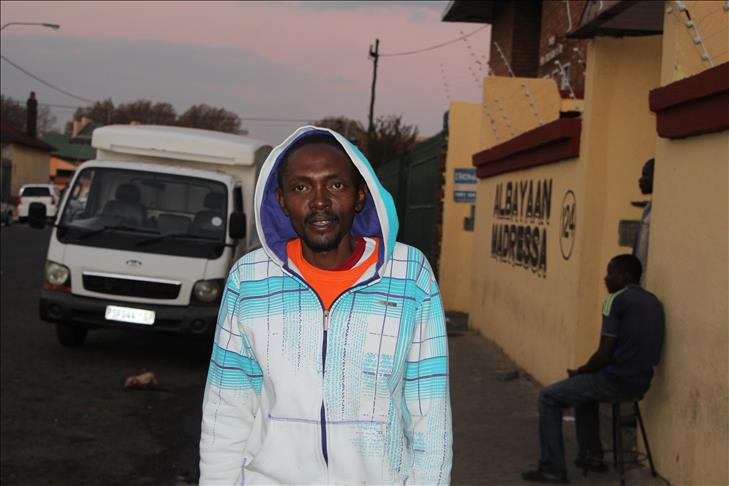Migrants decry South African police brutality
Police brutality in the country soared by 313 percent within the last decade, according to a security institute, with only one in every 100 cases brought against police officers leading to a conviction

By Hassan Isilow - Anadolu Agency
JOHANNESBURG (AA) - Migrants in South Africa are accusing police of using excessive force against them and soliciting bribes while conducting routine searches for criminals and illegal immigrants.
"I was beaten twice by police officers during a routine search in Mayfair, but I cannot open a case against them because they will come back and torture me," Eric Isa, a migrant from Kenya, told the Anadolu Agency.
Isa says he was walking down Albertina Sisulu Street in Mayfair, near Johannesburg, when police stopped and searched him on suspicions of carrying drugs.
"They found nothing, but insisted I take them to where I was hiding the drugs," he recalled.
"I told them I was not a drug dealer and then they started beating me," Isa claimed, adding that he had lost his cell phone, identity documents and cash in the process.
"After that incident, I was terribly traumatized," he said. "Whenever I see a police van, I feel very scared."
Yusuf Ibrahim Hassan, a 26-year-old Somali refugee, is another victim of alleged brutality at the hands of South African police.
"It was on New Year's Eve, 2010. I was sleeping in a hostel when four police officers came into my room and started beating me," he told the AA.
Hassan says the police had mistaken him for a wanted criminal.
"I tried to open a case against the policemen, but I was intimidated by their colleagues at the police station who told me I was wasting my time," he recalled.
The worst incident of police brutality targeting a migrant was recorded on February 26, when police officers handcuffed Mido Macia, a Mozambican taxi driver, to the back of a police van before dragging him down a street in Daveyton, east of Johannesburg.
The brutal incident was caught on film by a local resident who uploaded the footage on YouTube, triggering an international uproar.
Macia was later found dead inside a holding cell at the Daveyton police station.
In response to the ensuing global condemnation, South African National Police Commissioner Riah Phiyega immediately suspended the nine police officers accused of murdering the taxi driver.
Earlier this month, however, a South African court granted the nine officers bail.
Routine
Professor Loren Landau, director of the African Center for Migration and Society at Wits University in Johannesburg, says police harassment of migrants is commonplace.
"Some police officers believe migrants are more likely to be involved in criminal activity, so whenever they deal with them they tend to use excessive force, which is not acceptable," Landau told the AA in a telephone interview.
Landau, who has conducted extensive research on migration, says most migrants are afraid to file legal complaints against police officers for fear of reprisal.
"If migrants can organize themselves in groups and file a complaint through legal means, I'm sure the problem will be addressed," Landau said.
Alleged police brutality, however, is not limited to foreign nationals, with South African citizens complaining of the practice as well.
In August of last year, 34 people were killed after police opened fire on striking workers at the Marikana mine near Rustenburg. Over 70 people were injured in the confrontation.
In April 2011, national broadcaster SABC aired footage of local activist Andries Tatane being beaten and later shot by police during a protest march in South Africa's Free State.
This incident, too, sparked a national outcry.
"It's unfortunate that some police officers conduct themselves in an unprofessional manner, but that should not be viewed as the official image of the South African police services," national police spokesman Lieutenant-General Solomon Makgale told the AA by telephone.
Makgale insisted that only a handful of police officers were engaged in acts of brutality.
"We encourage the public to report police officers involved in misconduct and we shall start an immediate investigation into the claims," he said.
But a major crime conference organized last week by the Pretoria-based Institute of Security Studies (ISS) revealed that police brutality in South Africa had soared by a whopping 313 percent within the last decade, with only one in every 100 cases brought against police officers leading to a conviction.
Gareth Newham, head of the ISS' governance, crime and justice division, said that 1,448 serving South African police officials had previous convictions for serious crimes, ranging from murder to rape and assault.
"Why are convicted criminals allowed to continue to serve in the organization responsible for law and order?" Newham asked.
Anadolu Agency website contains only a portion of the news stories offered to subscribers in the AA News Broadcasting System (HAS), and in summarized form. Please contact us for subscription options.

